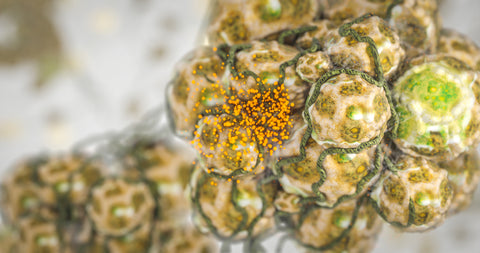
Syntol: Support for Intestinal Health and the Immune System

Probiotics, are often described as the “good” or “friendly” bacteria that reside in the digestive tract and for over a decade, research has shown that probiotic supplementation helps ward off the cold and flu by supporting a healthy immune system [1-4]. More specifically, a comprehensive review of clinical probiotic studies revealed that probiotics are better than placebos at promoting a healthy upper respiratory tract [5]. Research also indicates that probiotics promote healthy digestive function by binding to toxins in the intestines and decreasing their accessibility to the body [6]
Syntol contains 13.6 billion colony forming units (CFUs) of several non-competing strains of probiotic bacteria. One in particular called B. subtilis, is a spore forming bacteria that can withstand harsh intestinal conditions such as dramatic changes in pH or temperature. Its ability to thrive in sub-optimal environments improves the chances that spores will germinate and develop into healthy microflora within the intestines. Lactobacillus is also included in the formulation. This family of microflora produces hydrogen peroxide, which poisons yeast and promotes the removal of excessive yeast, especially Candida yeast, from the intestines.
In order to further enhance the removal of harmful yeast and bacteria from the body, a specific blend of enzymes was added to the formula.
These include:
-
Protease & Serrapeptase
(Promote the digestion of proteins) -
Cellulase & Hemicellulase
(Digest yeasts protective layers) -
Glucoamylase & Amylase
(Remove sugars that feed yeast)
The enzymes destroy the protective protein shell as well as the cellular components of Candida yeast, which intestinal bacteria generally struggle to remove without the assistance of additional enzymes and probiotics.
Overall, by supporting healthy digestive function while boosting the immune system, the one of a kind formulation in Syntol helps the body naturally remove toxins and bacterial imbalance.
References
- Alvarez-Olmos MI, Oberhelman RA. Probiotic agents and infectious diseases: a modern perspective on a traditional therapy. Clin Infect Dis. Jun 1 2001;32(11):1567-1576.
- de Vrese M, Winkler P, Rautenberg P, et al. Probiotic bacteria reduced duration and severity but not the incidence of common cold episodes in a double blind, randomized, controlled trial. Vaccine. Nov 10 2006;24(44-46):6670-6674.
- Hatakka K, Savilahti E, Ponka A, et al. Effect of long term consumption of probiotic milk on infections in children attending day care centres: double blind, randomised trial. BMJ. Jun 2 2001;322(7298):1327.
- Leyer GJ, Li S, Mubasher ME, Reifer C, Ouwehand AC. Probiotic effects on cold and influenza-like symptom incidence and duration in children. Pediatrics. Aug 2009;124(2):e172-179.
- Hao Q, Lu Z, Dong BR, Huang CQ, Wu T. Probiotics for preventing acute upper respiratory tract infections. Cochrane Database Syst Rev. 2011(9):CD006895.
- Kabak B, Brandon EF, Var I, Blokland M, Sips AJ. Effects of probiotic bacteria on the bioaccessibility of aflatoxin B(1) and ochratoxin A using an in vitro digestion model under fed conditions. J Environ Sci Health B. 2009; 44(5):472-80.